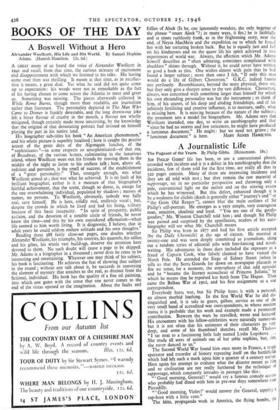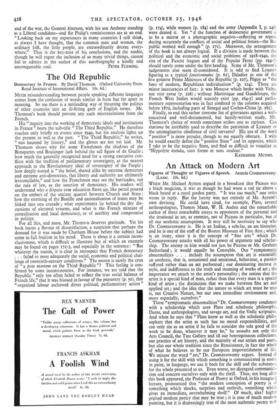A Journalistic Life
The Pageant of the Years. By Philip Gibbs. (Heinemann. 18s.)
SIR PHILIP Glans' life has been, to use a conventional phrase, crowded with incident and it is a defect in his autobiography that the incidents, few of them told for the first time, are really all that its 52o pages contain. Many of them are interesting incidents and they are all told with zest ; but they remain the raw material of rapportage, set in no particular perspective and throwing only a pale, conventional light on the author and on the stirring events which he has witnessed. But this defect, enhanced though it is by a weakness for clichés (death is generally either " journey's end " or " the Grim Old Reaper "), cannot blur the main outlines of Sir Philip's self-portrait. He emerges as a very simple, very courageous man, sensitive, idealistic and loyal. " You are one of the goody- goodies," Mr. Winston Churchill told him ; and though Sir Philip was pained .and surprised by the appellation, readers of his auto- biography will see what Mr. Churchill meant. Sir Philip was born in 1877 and had his first article accepted (by the Daily Chronicle) at the age of sixteen. He married at twenty-one and was soon deeply committed to journalism, eking out a random series of editorial jobs with free-lancing and novel- writing. His adventures in those days -included the exposure as a fraud of Captain Cook, who falsely claimed to have visited the North Pole. He attended the Siege of Sidney Street (when he tells us that the Scots Guards lay down on newspaper placards to fire we sense, for a moment, the atmosphere of that odd episode) and he " became the literary accoucheur of Princess Juliana," by which he means that he reported her birth from The Hague. Then came the Balkan War of 1912, and his first assignment as a war correspondent.
Everybody hates war, but Sir Philip hates it with a personal, an almost Morbid loathing. In the first World War he did dis- tinguished and, it is safe to guess, gallant .service as one of the very small band of accredited war correspondents, to whose modem status it is probable that his work and example made a permanent contribution. Between the wars he travelled, wrote and lectured. His encounters with his fellow-celebrities were naturally numerous, but it is not often that his estimates of their characters go very deep, and some of his thumbnail sketches recall Mr. Thake- " I sat next to a fascinating little lady named Lydia Lopokova . She made all sorts of animals out of her table napkins, but, alas, she never danced to us."
The Second World War found him once more in France, a tragic spectator and recorder of history repeating itself on the battlefields which had left such a mark upon him a quarter of a century earlier. Here again his attempt to evaluate what the disaster meant to him and to civilisation are not really furthered by the technique of rapportage, which constantly intrudes in passages like this:
Good morning, General! ' would cry a famous comedy actress who probably had dined with him in pre-war days somewhere neat Piccadilly. " Good morning, Violet!' would answer the General, tapping a top-boot with a little cane." The blitz, propaganda work in America, the flying bombs, the end of the war, the General Election, with his son Anthony standing as a Liberal candidate—and Sir Philip's reminiscences are at an end. " Looking back on my experiences in many countries I still think, as always I have thought, that the common man and woman, the ordinary folk, the little people, are extraordinarily decent every- where." That is the key-note of his conclusions, and the reader, though he will regret the inclusion of so many trivial things, cannot fail to admire in the author of this autobiography a kindly and































 Previous page
Previous page